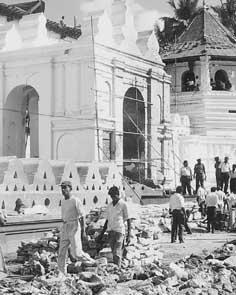


 The
attack on the Maligawa is heavy in symbolism
The
attack on the Maligawa is heavy in symbolism
“Me nidahas utsavaya
ivaravenakang apata nidahasak nehe”. (We will not have any freedom until
the freedom celebrations are over.) Its pithy in Sinhalese, though rather
stilted in Prince Charles’ language . .But, as far as the general mood
goes, that’s largely what it is.
Many writers in this newspaper’s independence apocalypse edition strike the ironic note . (What independence etc., etc., they say, predicting a trying fifty years ahead.)
Interestingly, what will the history books say about the celebrations themselves? That the masses, and the Deputy Minister of Defence , looked at unfolding events with resignation?
When the past pales into insignificance at the enormity of the present crisis, well, that’s when we know that the nation needs to “get real.’’ (An Americanism for sure, but Prince Charles’s language keeps evolving.) However, mankind cannot stand too much reality , to borrow that quote.
That’s why the government and the people necessarily have to look at this historical intersection with a good deal of mixed feelings. The Buddhist Jathaka’s had a story of a man who enjoyed a feast from a honeycomb while seven deaths stared him in the face. Life’s itself is like that, the Buddha explained by way of moral to the story.
The attack on the Dalada Maligawa is heavy in symbolism, but what’s heavier in symbolism is the resignation of the Deputy Minister of Defence. Though it has never been so apparent that the LTTE decides the politics of the “Sinhala nation’’, it is also not some novel discovery, considering that many political developments in the recent past can be traced back to the LTTE. Chandrika Kumaratunga would not have been President if the LTTE hadn’t assassinated many Sinhala leaders before her. Anuruddha Ratwatte certainly would not have been Deputy minister of Defence if Chandrika Kumaranatunga didn’t become President.
Would the leaders of this nation want some of these facts to be held in sublimation, until the party is over? But wouldn’t too much fantasy be bad, like too much reality?
The next item on the reality check would be the ban on the LTTE. In a week that was suffused with symbolism, the ban on the LTTE was also not out of character because it had a largely symbolic quality to it.
It was not as if the government was ordering its pet poodle out of the house. If it was an exercise in appeasement, the state also vindicated the positions of the lobbies which had been asking for the LTTE to be proscribed. Perhaps the LTTE did not qualify for proscription when the organisation ordered bomb attacks on civilian targets in Dehiwela, or attacked the Central Bank on a working day, accounting for casualties of earthquake proportions.? Had the cold walls of the Maligawa , sacrosanct though they may be, to be mangled by LTTE aggression for the state to conclude that the LTTE had to be banned?
This fairly typifies the staccato nature of the state’s reaction to crisis. Even the hardboiled cynics would have been impressed by the resignation of Anuruddha Ratwatte, for example. Taken at face value, the resignation could be seen as a throwback to a time when the discourse was more honourable. But when the resignation was not accepted, it appeared as finally more authentic and true of the times we live in. Resignation is made all the more easier when one knows that the letter of resignation is not likely to be accepted. So even the brave seem to be actors in a burlesque in which anything can happen and nothing is real anymore.
What it all means is that there are no safe assumptions or absolutes as we approach the jubilee of independence . Familiar realities have been replaced by a new discourse in which just about any doctrine could be spinned or rationalised.
Small wonder then that independence and the gravitas associated with the event has become a refuge for the national psyche. To conclude that we have survived despite petty squabbles and divisions may be one way of looking at it. We have made it, phew! But the other angle would be that we were supposed to prosper, not to make it through the night. But something happened on our way to greatness. Singapore took over, probably. Scientific technological and social achievement were subsumed by economic factors . Since then, it appears we are groping for reasons. Was paradise lost because of a lotus eating nation never had the real yen for greatness though we have always entertained the dream in our heads. Or on the alternate, were we done in by a bunch of corrupt leaders who did not have any vestige of vision or sense of direction? Maybe it was none of the above, and it was that we continued to be flotsam in an international system which favoured neo colonial, coca colonising predators? Answers may be hard to come by, or they may come in the next fifty years, which is why this jubilee would be more landmark than celebration, more of stock taking than feeling good.
Go to Hulftsdorp Hill by Mudliyar
Return to the Editorial/Opinion contents page
